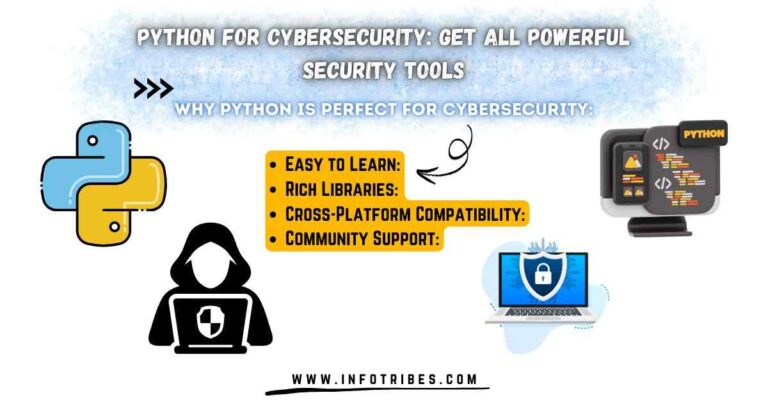Black Hat Python: The Ultimate Tool for Ethical Hackers and Cybercriminals
Python has gained dominance in cybersecurity because it provides programmers with flexibility together with user-friendly interfaces along with comprehensive library functionality. Python serves both ethical hacking needs and penetration testing and security research purposes yet cybercriminals especially favor its capabilities. The offensive usage of Python for cybersecurity operations is categorized as Black Hat Python when executed for malware development and exploit scripting and network penetration tasks. The article examines Black Hat Python as an instrument held by cybercriminals as well as ethical hackers who use its dual capabilities.
Understanding Black Hat Python
Black Hat Python refers to Python coding scripts alongside offensive techniques which attackers use for cybercrimes. The phrase stems from Black Hat Python: Python Programming for Hackers and Pentesters written by Justin Seitz although he produced this book to instruct ethical hackers and penetration testers. Even though the book serves ethical hackers and penetration testers it contains methods which malicious individuals can turn against ethical purposes.
Security professionals can develop unique tools through Python because of its straightforward syntax and numerous libraries to perform tasks that include:
- Network scanning and exploitation
- Malware development
- Reverse engineering
- Keylogging and credential harvesting
- Automating attacks and penetration testing

Hacking operations benefit from the selection of Python due to multiple important factors.
- The cybersecurity community strongly prefers Python because of several key factors.
- The basic Python syntax enables novice programmers and professionals to easily learn and utilize the language.
- Python serves security needs perfectly because it offers three essential libraries including Scapy Requests along with PyCrypto.
- Python scripts maintain high versatility because they operate across Windows Linux and macOS platforms.
- Python provides hackers the capability to create automatic systems which perform repetitive operations including vulnerability scans and password brute-forcing attempts.
- Python integrates without hassle with penetration testing tools through its interface with Metasploit Nmap and Wireshark.
You Can Also Read: cybersecurity jobs entry level: Best Roles & Salaries
Ethical Hacking with Black Hat Python
The security skills of white-hat hackers rely on Black Hat Python to locate and resolve system vulnerabilities which will otherwise become targets for cybercriminals. Python serves ethical hackers through multiple applications for their purpose including:
1. Penetration Testing
Security penetration testers conduct attacks through the execution of Python computer scripts that mimic actual cyberattacks. The security tools AutoPwn and SQLmap both use Python to help professionals detect vulnerabilities present in web applications and network systems.
2. Network Security Auditing
By utilizing Scapy library Python provides ethical hackers with the ability to examine network traffic while building personalized packets and identifying configuration flaws.
3. Exploit Development
The development of proof-of-concept exploits by ethical hackers relies on Python as their coding language for vulnerability testing. The Pwntools library is a commonly used tool for exploit development and testing purposes.
4. Reverse Engineering and Malware Analysis
By decompiling and analyzing malware through Python ethical hackers gain information about its operating systems. The toolkit used by ethical hackers for analyzing malicious code includes Radare2 and PyREBox.
5. Password Cracking and Brute-Force Attacks
Scripting software in Python enables automated brute-force attacks that use dictionary-based login intrusion for credentials and wordlist verification. Python tools help ethical hackers evaluate password robustness while suggesting better security measures.
Cybercriminals and Black Hat Python
The abilities which make Python useful for ethical hackers enable cybercriminals to carry out malicious activities. Black Hat Python techniques find their most common misuse through various methods including:
1. Malware Development
Python code enables cybercriminals to build trojans and ransomware型 along with alternative types of malware. Two Python development tools called PyInstaller together with cx_Freezewant to create executable harmware files which can bypass security systems.
2. Keylogging and Credential Theft
Python scripts allow the development of keyloggers which record user keystrokes to steal passwords along with credit card details.
3. Phishing Attacks
Python tools enable hacking activities by creating deceptive login websites which distribute massive phishing communications towards innocent targeted users.
4. Botnets and DDoS Attacks
Python enables criminals to develop botnets for executing Distributed Denial-of-Service attacks that disable online services.
5. Exploiting Web Applications
The Python security tool SQLmap assists hackers when they need to take advantage of SQL injection vulnerabilities in order to breach database security.
Popular Python Libraries for Hacking
Python provides multiple libraries that hackers use either for illegal purposes or authorized ethical investigation and assessment. Some notable ones include:
- Scapy – Network packet manipulation
- The web scraping tool and attack automation implementation system operates through HTTP requests.
- Socket – Network communication and exploitation
- PyCrypto – Encryption and decryption of data
- Impacket – Windows security attacks and exploitation
- The BeautifulSoup library enables users to extract data from websites.
- Paramiko – SSH automation and penetration testing
The Ethical Debate: White Hat vs. Black Hat
A serious ethical problem exists because of Black Hat Python usage. Security experts in both ethical hacking and cybersecurity state that offensive security skills need to be known by personnel to protect networks from threats. System-compromising acts arise when black-hat hackers use the same knowledge obtained from ethical hacking sources.
- The deciding factor between white-hat and black-hat practitioners rests on their intentions along with authorization responsibilities.
- White-hat hackers receive legal permission to use Python-based tools that enhance security systems.
- Black-hat hackers search for system flaws which they use to execute unlawful and destructive activities.

Keeping Yourself on the Correct Path of Cybersecurity
The following steps can guide your learning of Black Hat Python which leads to ethical hacking:
- Penetration tests must be authorized and should only be performed by those who hold proper authorization.
- Consider earning credentials through the CEH certification as well as the OSCP certification.
- Take part in legal ethical hacking through Hack The Box and CTF competitions that will help you build your professional abilities.
- Know all cybersecurity laws at local and international levels because violation of these laws can lead to legal complications.
You Can Also Read: 10 Shocking Facts About Llama Framework Flaw and RCE Risks
Conclusion
Black Hat Python functions as a powerful tool which ethical hackers and cybercriminals utilize for their separate professional needs. The precisely the same capability permits both ethical hackers along with cyber criminals to accomplish their distinct missions because ethical hackers defend systems against attacks yet cyber criminals take advantage of these skills to conduct illegal activities. Cybersecurity professionals need to understand how Black Hat Python functions as two separate entities to effectively protect against cyber threats. The purposes for Python implementation rest with user intentions but ethical hackers need to direct their skills toward creating digital security.
Some FAQ’s
1. What is Black Hat Python?
- ANS: Python used as a tool to conduct cybersecurity attacks falls under the category of Black Hat Python when security professionals utilize it to perform penetration testing together with malware development and exploit script creation.
2. Is Black Hat Python illegal?
- ANS: The illegal application of Black Hat Python includes unauthorized hacking together with cybercrime activities. The methods that ethical hackers employ to test security belong to the same domain yet their legal status comes from obtaining proper authorization from authorities.
3. Among Python libraries which are optimal for hacking purposes which ones should be used?
- ANS: Hackers rely on four main Python libraries namely Scapy for networks and Requests for web access together with PyCrypto for encryption and Impacket for Windows security attacks.
4. A newcomer can master Black Hat Python for their skills.
- ANS: New learners must first understand basic Python programming fundamentals before moving onto security subjects and concepts. Certifications such as CEH or OSCP will assist students in their learning journey towards ethical hacking skills.
5. Ethical hackers incorporate Black Hat Python in what ways for their activities?
- ANS: The hacking community uses Black Hat Python to conduct penetration tests and run vulnerability checks and network security audits as well as reverse engineer systems for better cybersecurity protection.
6. The sites where one can lawfully practice their Black Hat Python expertise exist where?
- ANS: The practice of hacking skills through legal avenues happens on platforms including Hack The Box, TryHackMe and Capture The Flag (CTF) challenges that allow users to engage in ethical skill assessment.
7. Does using Black Hat Python entail any safety hazards?
- ANS: The unlawful use of Black Hat Python may result in legal penalties which could involve financial penalties together with jail time. To use Black Hat Python ethically one needs both authorization from appropriate sources and compliance with cybersecurity regulations.







